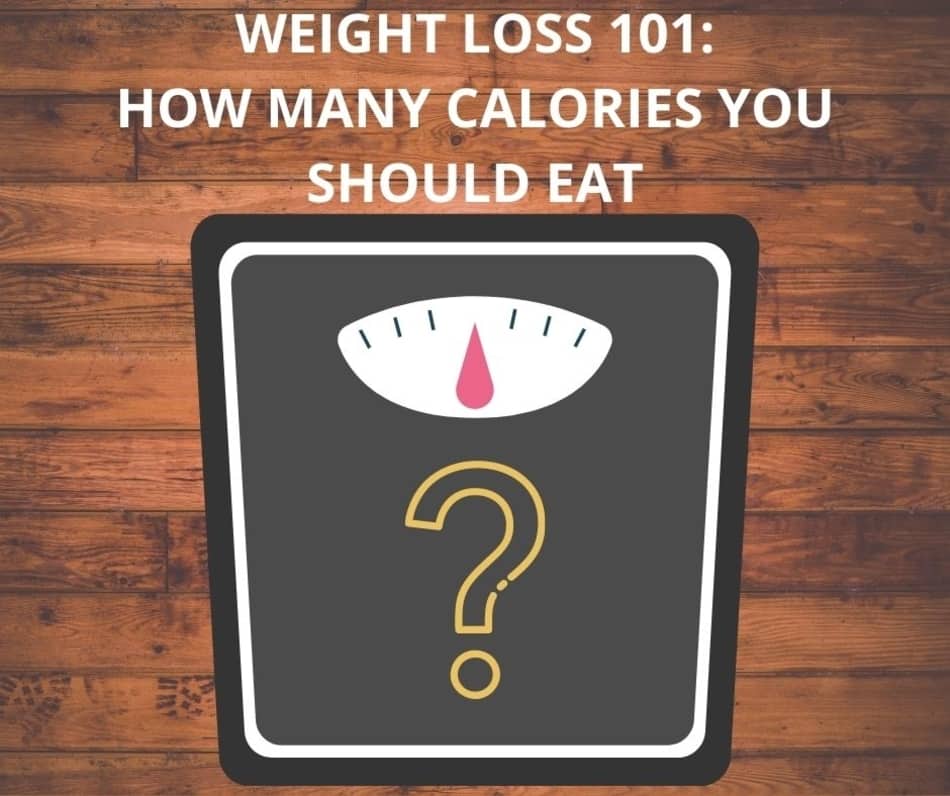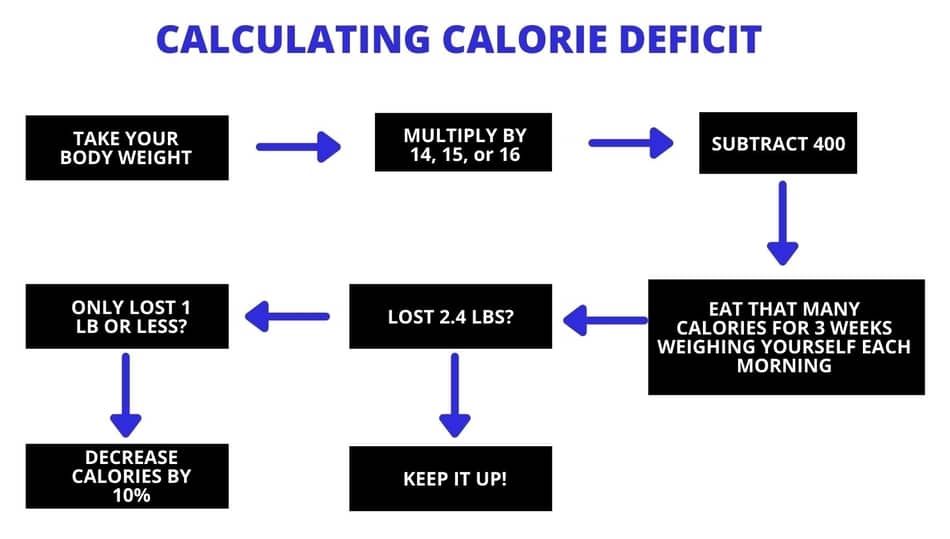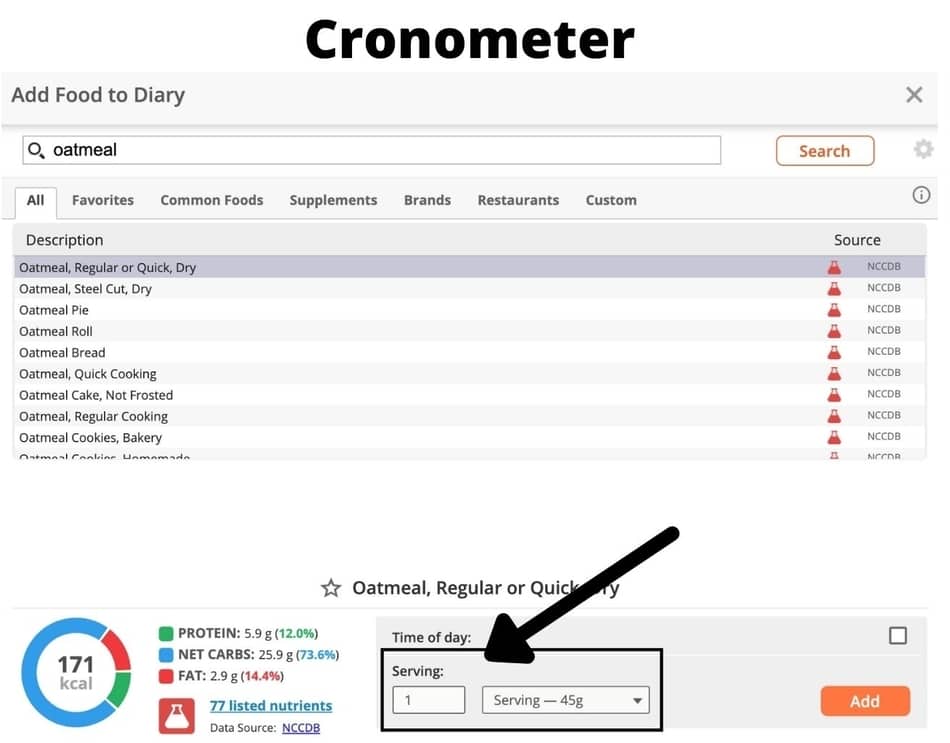
While weight loss is slightly more complicated than just calories in calories out (which I will discuss in a future article), being in a calorie deficit is the biggest determinant when it comes to weight loss.
In part one of this three part series on weight loss, I talked about Total Daily Energy Expenditure, the four ways your body burns calories. If you haven’t read that article, I’d recommend reading that first before continuing on with this article so you can better understand the different ways in which we burn calories.
In this article, I will provide you with simple steps so you can easily calculate the number of calories you should eat each day so you can start losing weight immediately (or gain weight if that’s your goal).
Do You Need To Track Calories?
If I’m being honest, I’m actually not a big fan of tracking calories as a long term “sustainable approach” to the way we eat food (even if it’s for weight loss) because I think tracking calories can significantly take the focus off “eating for health.”
If you are constantly tracking your calories, then the number one goal of nutrition then becomes “I need to stay within my calorie limit” as opposed to “I should fuel my body with the foods that will promote health and longevity.”
With that said, when it comes to weight loss, there is a lot of value in tracking your calories for a short period of time for multiple reasons.
For one, research shows that individuals consistently underreport how many calories they believe they are eating.
Secondly, you will learn about your eating habits throughout the process, not only in regard to how much you are eating, but you will also become more conscious in terms of the types of foods you tend to eat, portion sizes, etc. If you choose to do this, once you get a better sense of how much you are actually eating, you no longer need to track your caloric intake if you choose not to.
Last but not least, if you track your calories for, let’s say 4 weeks, and you hit your caloric target, you will likely lose a couple pounds, which can kick start your weight loss journey and provide you with the motivation to keep going.
So in short, while I don’t love the idea of calorie counting as a long term solution because it can take away from eating as a way to optimize health, I think it is very helpful for most people at first.
Why Do Calories Matter?
Put simply, calories in the foods that we eat are used to provide the body with energy to function properly. All functions of your body require energy (and therefore calories), such as your heart beating, your lungs breathing, or your body moving.
As a result, a term known as maintenance calories is the number of calories your body burns on a daily basis (it is also the number of calories you need to eat each day to maintain your current weight).
If you consume fewer calories (energy intake) than you burn (energy expenditure), you will lose weight because your body uses all of the energy from the food you eat, and you will then need to burn body fat for energy.
If you consume more calories than you burn, you will gain weight because your body will have an excess of energy supply (calories) that will be stored as fat.
Therefore, creating a calorie deficit, where you eat fewer calories each day than your body uses, is the most important factor when it comes to weight loss.

While you can either exercise more (to burn more calories) and/or eat fewer calories to create a calorie deficit, it is far easier to eat fewer calories.
After all, you will burn roughly 100-200 calories walking for 30 minutes, but you could eat those 100-200 calories right back in a matter of 2 minutes.
This is not to say that exercise doesn’t matter. It does and you should definitely still do it for both weight loss and overall health. But I find it more helpful to think of cardio and weight lifting as a means to supplement a diet that already puts you in a calorie deficit.
In fact, research shows that cardio alone is not very effective if your goal is weight loss. Only doing cardio as a means to create a calorie deficit is not sufficient. However, doing cardio in addition to eating a diet that puts you in a caloric deficit is an effective approach.
As a side note, if you are in a caloric deficit and trying to preserve or gain muscle (which you should!), it is very important to lift weights. Research demonstrates the benefit of lifting weights on preserving lean muscle mass when in a calorie deficit because your body is more prone to losing muscle when in a calorie deficit.
Creating The Optimal Calorie Deficit
Now that we have some background, let’s talk about how many calories you should be eating on a daily basis to optimize weight loss in a sustainable way.
I have found that a good estimate to put you in a caloric deficit is to take your “goal” body weight in pounds and multiply it by 12.
For example, if you are currently 175 pounds and your goal body weight is 155 pounds,
155 x 12 = 1860 calories
Theoretically, if you eat 1860 calories each day, that should be the perfect number where you are in a caloric deficit and will begin to lose weight.
While this article is specifically intended to discuss weight loss, if you want to maintain your weight, I recommend multiplying your body weight by around 13-14, and if your goal is weight gain, I recommend multiplying your goal body weight by anywhere from 14-15.
Once you have established the number of calories you need to eat each day to lose weight, you need a way to track this progress to determine if the estimation we made above is working for you.
At the end of the day, while the above calculation works for most people, it is just an estimate as there is no way to quickly identify the exact number of calories you need to eat each day to lose weight. For that reason, you may need to adjust it accordingly after some trial and error.
*If you are currently working with me, don’t worry about this process because I will do it for you and ensure you are making proper progress.
To test this number, eat the number of calories you calculated in the step above for 30 days and weigh yourself in the morning under the same conditions each day (after using the bathroom).
After 30 days, you should have lost a couple pounds of fat (yes, just a couple pounds, not 5, 10, or 15).
After those 30 days, if you did not lose any weight, I recommend decreasing your calories by an additional 10%.
This should ensure you are in a calorie deficit and you will begin to lose weight.
After those 30 days, if you lost more weight than you wanted and felt as though it was unsustainable, increase your calories by 5-10%.

Why Do I Use Goal Body Weight?
The main reason I use goal body weight for calculating how many calories you should consume each day is because it is very simple.
There are many different ways to estimate the number of calories you should eat each day, but at the end of the day, this is what I find to be most simple and effective. If you do it properly, you should be on your way to losing weight.
I want to note that the goal body weight is simply a reference number so you can estimate the number of calories you should be eating each day. It does not mean you need to continue eating that same number of calories until you reach that weight.
For example, if you are 175 pounds and you want to get down to 155 (like the example above), then you can use 155 as the goal body weight. However, if you get to 165 and feel satisfied, then you no longer need to eat in a caloric deficit, meaning you can increase the amount you are eating and maintain your current weight.
3500 Calories in 1 Pound of Fat
While it is definitely not a perfect science, the general rule of thumb is that there are 3500 calories in a pound of fat.
Therefore, when it comes to being in a calorie deficit, I often suggest a deficit of 500 calories per day (eating 500 fewer calories than your body burns each day), as that will allow you to lose about 1 pound of fat per week. Multiplying your goal body weight by 12 should roughly put you in a 500 calorie deficit.
The issue with this rule of thumb is that as you lose weight and get lighter, it requires a bigger deficit because your body naturally slows down its metabolism (because it has to work less hard the lighter you are).
That said, for simplicity, just understand that there’s close to 3500 calories in a pound of fat.
It’s a good reminder that just because you had one “bad” weekend, it doesn’t mean you lose all your progress. Let’s say your body burns 2500 calories per day. If you had 3500 calories on both Saturday and Sunday, that’s only an extra 2000 calories, just over 1/2 a pound of fat.
So what you should do in that scenario is to just get back on track and remain consistent.
Don’t shame yourself and try to do 5 hours of cardio and eat 10 calories total on Monday because you overate on the weekend. That will only lead you to binge in the coming days/weeks.
Instead, just get back on track with your normal calorie deficit and the weight will begin to come off.
What Matters Is Average Calories Over Time, Not Day by Day
This is extremely important.
Using the example above with 3500 calories equaling 1 pound of fat, what matters is the average number of calories you’re eating.
In the above example, if you ate in a 500 calorie deficit Monday through Friday, that would be a deficit of 2500 calories. But if you ate in a surplus of 1000 calories every Saturday and Sunday, that would be a surplus of 2000.
So in the week, your net calorie deficit would only be 500 (2500 – 2000), meaning it would take you 7 weeks to lose 1 pound of fat (3500 calories in a pound of fat divided by 500 calorie deficit per week).
This is why consistency is so important.
You can’t just be consistent Monday through Friday and make the progress you’re looking for.
It’s fine if you have a weekend where you go over your calories, but on average, if you stay consistent, you’ll see better progress.
By the same token, it’s no big deal if you went over your calories one day. Just get back on track, continue eating in a calorie deficit, and the weight will come off.
Why Not Create A large Calorie Deficit?
If you were to create a larger calorie deficit, you would likely find yourself:
- Fatigued during the day
- Craving food causing you to binge eat
- Losing muscle instead of just fat
- The list goes on and on
One other important consideration is that if you decrease your calories too much, your body’s functions/metabolism will actually begin to slow down, meaning your body will not use as much energy each day to function.
This is because your body only cares about survival. So if you decrease your calories too much, your body will adapt to these demands and it will slow down its own functions in order to keep its energy stores and survive.
This obviously isn’t an ideal situation when trying to lose weight. We want your body to be functioning at an optimal level, while also losing body fat.
This is why multiplying goal body weight by 12 (creating a smaller but very effective calorie deficit) likely creates an optimal calorie deficit for weight loss.
That said, let’s say you burn 2500 calories per day so you are eating 2000 calories per day to be in a 500 calorie deficit, if you ate 1800 calories and it’s 9pm and you aren’t hungry, you shouldn’t eat more food just to reach 2000 calories.
You will lose weight faster if you don’t do that for the obvious reasons I just explained.
How Do I Track My Calories?
At this point, if you have never done this before, you are probably wondering how you should go about tracking your calories.
I have written an entire article on how to track your calories (click here), but for now, let’s talk about the basics.
While there are many ways you can track the number of calories you eat, I suggest using a simple free app like Cronometer or My Fitness Pal. These are easy to use apps where you input the foods you eat and it tracks your daily caloric intake for you.
You just need to make sure you find the right foods on the app and input the appropriate portion sizes.

Weighing your food is another potential option, considering that the weight per serving of any food is on most nutrition labels. If you have a food scale or want to buy one, simply weigh your foods before you eat them and find out how many calories are in each food by either looking at the nutrition label (if there is one), or looking it up online.
Keep in mind that when you are tracking your food, you need to track everything you eat and drink. The butter on your toast, the oil on your food, the alcohol you drink. These foods/drinks are often overlooked, but it all adds up and needs to be counted.
Again, while this process seems tedious right now, I promise if you do this for 30 days, you will benefit from the process and not only will you become much more conscious of your eating habits, but you will be right on your way to achieving your weight loss goals!
Slower Progress Is More Sustainable
The most important factor relating to this process is patience. The reason most people fail their weight loss goals is because they give up too early.
In most cases, it is not about losing weight as fast as possible, but rather establishing an approach that is sustainable and allows you to stay consistent a longer period of time.
While big short term progress does sound nice, if you can’t maintain it over a long period of time, what’s the point?
Step By Step Review To Lose Weight
- Multiply your goal body weight by 12 to find out how many calories to eat to be in a caloric deficit
- Eat that number of calories for 30 days
- Weigh yourself in the morning each day under the same conditions (after using the bathroom)
- After 30 days If you have lost 2+ pounds, continue doing that. If you don’t lose any weight, reduce the number of calories you eat by 10%. If you gain weight, you might not be counting your calories correctly, in which case you might want to further investigate that.
While this is not a perfect science, it works very effectively for most people.
As long as you follow the steps outlined in this article, you will be well on your way to losing the stubborn fat you’ve always wanted to lose.
And just to top things off, in part three of this article series on weight loss I discuss my top 10 strategies to lose weight. You can find that article here.
I hope you learned something in this article. If you have a questions relating to your own goals, I’d be happy to help. Ask them below and I’ll answer them as soon as I can!

